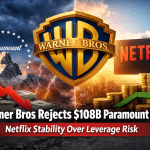Ray Dalio Warns: Billionaire Who Predicted 2008 Crash Says U.S. Is Sliding Toward a “Pseudo Civil War”
Billionaire investor Ray Dalio — the man who famously predicted the 2008 financial crash — has warned that America is now “on the brink of a civil war of some sort,” driven by deep divisions, runaway debt, and a fading sense of national unity.
In an interview with Bloomberg, the Bridgewater Associates founder — whose hedge fund manages more than $125 billion — said the United States is already entangled in “multiple overlapping wars” that threaten its economic and political stability.
“We’re in wars,” Dalio said. “There is a financial war, a technology war, geopolitical wars — and a civil war of some sort developing in the U.S. and elsewhere, where there are irreconcilable differences.”
His warning, echoed by global analysts, underscores growing fears of an American economic collapse, political gridlock, and the breakdown of trust in democratic institutions.
“We’ve Been Here Before — and It Didn’t End Well”
Dalio drew comparisons between today’s climate and the pre–World War II era of 1937–1938, when economic inequality and debt-fueled instability weakened democracies worldwide.
“You have debt issues, internal conflicts over wealth, and disorder forming,” he said. “That’s what happens when empires reach the end of their cycle.”
The billionaire — who correctly foresaw the 2008 housing and banking meltdown — now warns that America’s $38 trillion national debt and 120% debt-to-income ratio could trigger a “self-reinforcing death spiral.”
He described a feedback loop where rising interest payments fuel more borrowing, weakening confidence in U.S. Treasury bonds and driving inflation — a cycle he believes could define the 2025–2030 decade.
The “Civil War” Already Happening
While Dalio stopped short of predicting physical conflict, he said the U.S. is already in the midst of a “pseudo civil war” fought not with weapons but through politics, media, and money.
“This is not a war fought with muskets,” he said. “It’s fought with narratives — with influence and control.”
He warned that wealth inequality and partisan extremism have become the new battle lines. With the top 1% controlling over 30% of national wealth, and the middle class shrinking, Dalio believes America’s internal cohesion is unraveling faster than policymakers admit.
“When people can’t agree on the rules, societies break down,” he added.
Global Power Shifts: The Rise of China and the Decline of the West
Dalio’s latest remarks extend beyond America’s domestic challenges. He says the same historical forces — debt, inequality, and technological disruption — are redrawing the global order.
“The forces that shape the world — money, order, technology, and geopolitics — are all being disrupted,” Dalio said. “America is simply the most visible example.”
He pointed to growing geopolitical friction between China and the U.S., trade and technology wars, and the rise of competing financial systems outside the dollar-based economy.
“We are living through the end of one era and the birth of another,” he warned. “The transition will not be smooth.”
Lessons from 2008 — and Warnings for 2025
Dalio’s warnings carry weight because of his record. In 2007, when most Wall Street banks dismissed recession fears, he predicted the global financial crisis, earning billions for Bridgewater investors.
Today, he sees the same signs returning — rising leverage, inflated asset prices, political denial, and institutional fragility.
He’s joined by a chorus of financial leaders, including Richard Hughes, chairman of the UK’s Office for Budget Responsibility, who recently told lawmakers that surging government debt and long-term tax dependency were “reasons to worry.”
What Investors Can Learn from Dalio’s Warning
Ray Dalio’s warning isn’t just a forecast — it’s a playbook for survival. He has long argued that successful investors must think in cycles, not headlines, and prepare for decades of volatility rather than years of growth.
In his own words, resilience requires:
-
Diversification across currencies and regions
-
Ownership of real assets such as gold, energy, and infrastructure
-
Protection from currency debasement and political instability
“The goal is not to predict the next crisis perfectly,” Dalio said in a recent note to clients. “It’s to build systems that can survive one.”
Analysts interpret that as a call for investors to reduce exposure to high-debt economies and rebalance portfolios toward tangible assets — a strategy already seen in Bridgewater’s 2025 restructuring.
For those watching closely, Dalio’s message is clear: don’t mistake calm markets for stability.
The Final Warning
Dalio believes the U.S. still has time to reverse course — but only if political leaders confront economic reality.
“You can’t solve a debt crisis by printing money. You can’t solve division by ignoring it,” he said.
His closing message was as sober as it was urgent: “If America fails to reform both economically and socially, it risks a slow-motion decline into disorder.”
For the billionaire who once foresaw the world’s last great crash, that’s a warning worth taking seriously.














